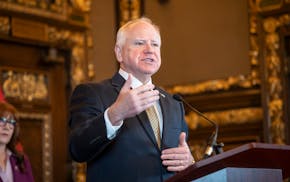Higher mortgage rates had a disparate impact on housing construction in the Twin Cities metro during 2024, causing apartment construction to wither while homebuilding gained ground.
Last year, cities issued builders and developers 6,281 single-family permits, a 14% increase from last year, according to a year-end report from Housing First Minnesota, the state's largest trade group for builders. At the same time, there were only 2,330 multifamily units — mostly rental apartments — permitted, 55% fewer than the previous year.
"Interest rates had a big impact on homebuilding in 2024," said Art Pratt, 2024 board chair of Housing First Minnesota. "The affordability issue is a real problem."
After falling to an all-time low of 2.65% in early 2021 and remaining unusually low for the next couple of years, rates went on a roller-coaster ride last year, ending just below 7%. While that's slightly lower than the historical average from the past five decades, those higher rates came at a time when construction costs — and home prices — remained near all-time highs.
On Thursday, the average 30-year fixed-rate mortgage rose slightly from earlier in the month to 6.93%, according to a weekly Freddie Mac survey.
Homebuilders have so far managed to keep constructing despite higher rates, but homebuilding isn't happening at the same pace as just two years earlier. Still, a lack of willing sellers has forced many would-be buyers to build a new home rather than a buy an existing one, so builders are focused on increasing their inventory of move-in-ready houses.
At the end of November, there were only enough previously owned single-family houses on the market to last a little more than two months compared with a nearly six-month supply of newly built single-family houses, according to the Minneapolis Area Realtors (MAR). A balanced market between buyers and sellers occurs when there is a four- to five-month supply of inventory.
Pratt, a longtime custom homebuilder in the metro, said rate volatility has made some buyers nervous about placing an order for a house that won't be ready for several months, during which rates could rise. In response, builders are stockpiling.
"When mortgage rates were lower, they didn't have to have inventory," Pratt said. "People were willing to wait."
Pratt said more expensive new homes were a hot ticket last year as move-up buyers traded equity and savings for a home purchase. For many of his buyers, mortgage rates don't matter: They can pay cash. For most entry-level buyers, however, a new home is simply too expensive.
The median price of a new single-family house in the Twin Cities at the end of last year was $534,366, nearly $140,000 more than previously owned, according to MAR.
For many apartment developers, higher mortgage rates and construction costs have made it too expensive to build despite strong demand throughout much of the metro. Rental apartments, senior housing and other multifamily housing normally accounts for about half of all to-be-built housing in the metro, but last year, that segment accounted for only about a quarter of all homebuilding.
"While the housing market has faced challenges [in 2024], the recent uptick in construction of all types of housing shows there's still momentum in the market as we head into 2025," Pratt said, referring to a strong December for permit issuance.
The 8,611 total housing units permitted throughout the metro last year was the fewest in at least five years, with 2024 lagging the previous year by about 2,000 units. Construction peaked in 2022 with nearly 16,000 units. With 620 units, Minnetonka saw the most activity, with Lakeville and Rosemount following.

Delta hiked fares for solo travelers, until Twin Cities travel experts caught the change

In first speech back, UnitedHealth's new CEO pledges to review hot-button issues

A child had measles at Mall of America, concerning state health officials who don't know source

Ramstad: Gov. Walz, things are not getting done in Minnesota
